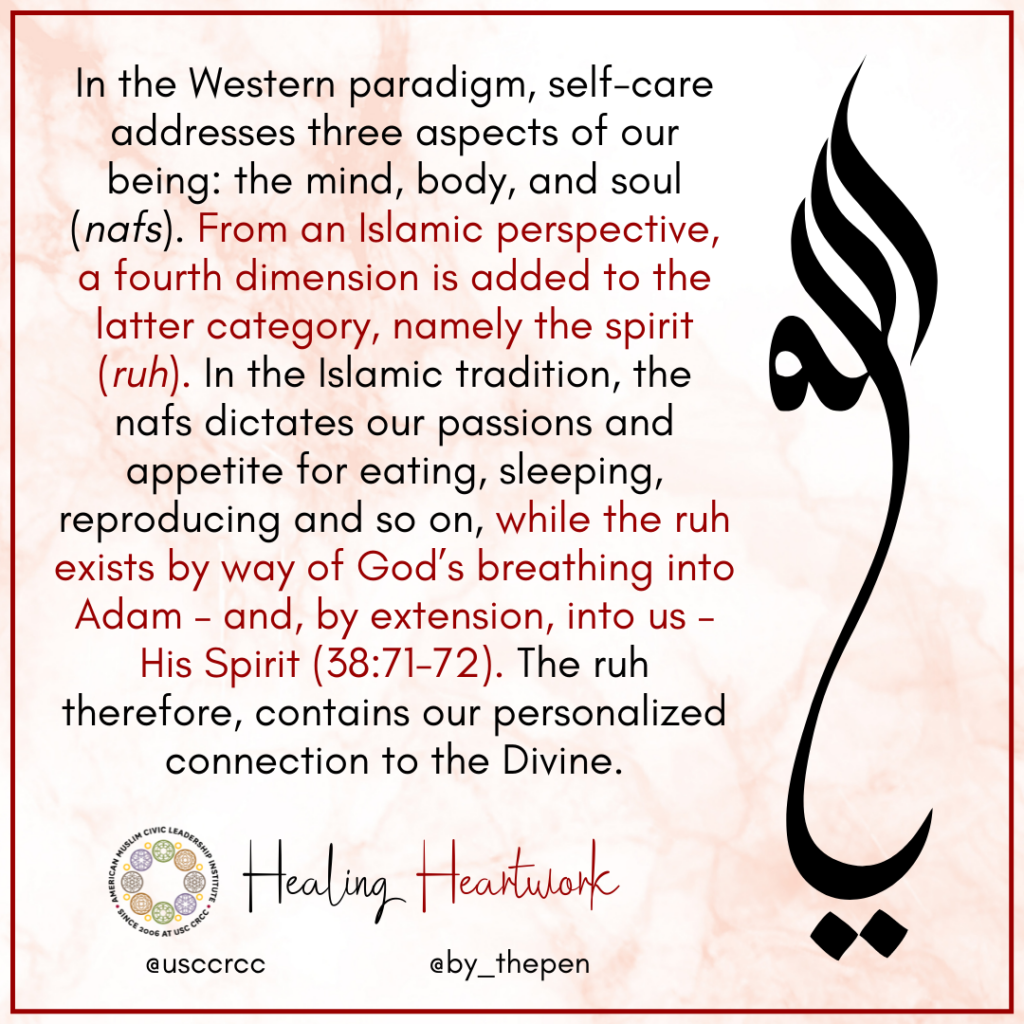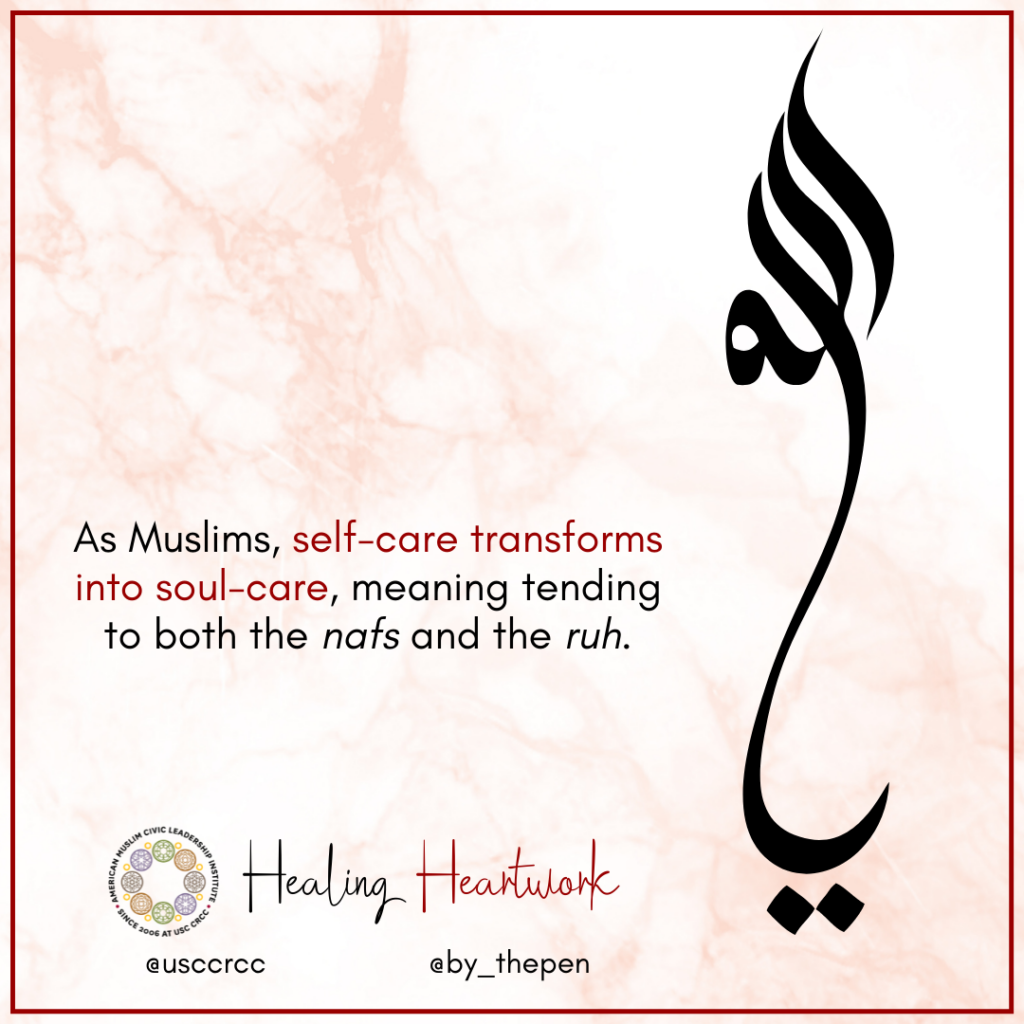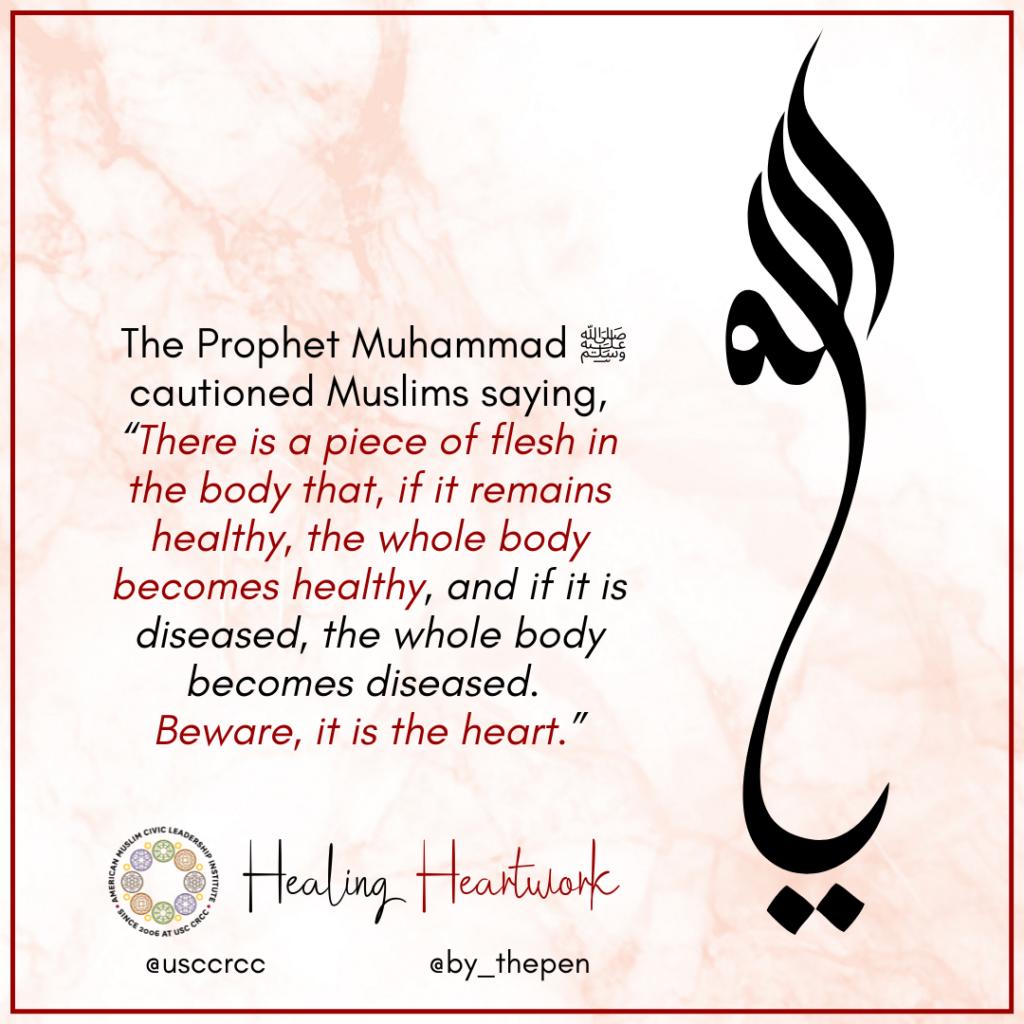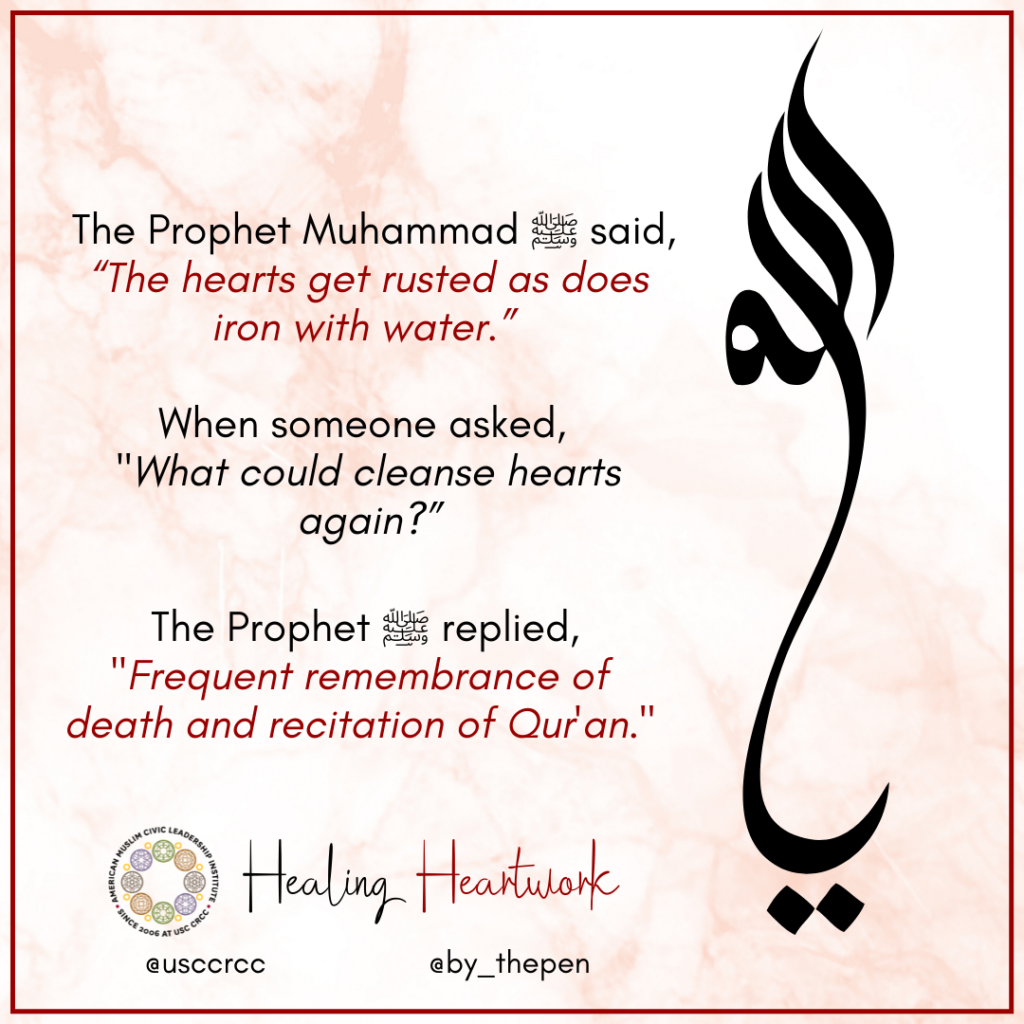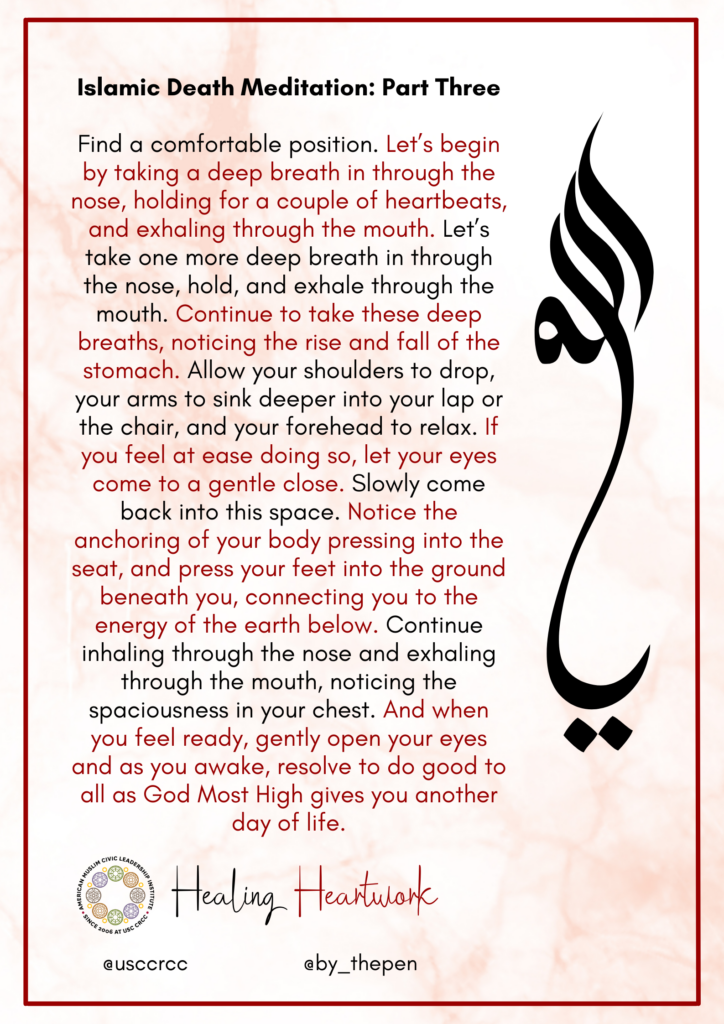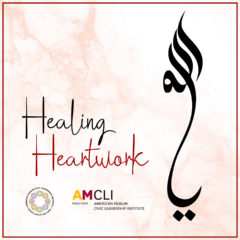As we enter into the last ten – and most blessed – days and nights of Ramadan, we shift our focus to the theme of safety. The Prophet Muhammad ﷺ said: “It (Ramadan) is the month, whose beginning is mercy, its middle, forgiveness and its end, emancipation from the fire.”
Emancipation from the fire in the afterlife in the Islamic tradition translates to a soul at peace (Qur’an Surah Al-Fajr 89:27-28) in the Eternal Garden. The Prophet’s ﷺ choice to emphasize freedom from the fire is meant to impact our psychology as we hear this prophetic testimony. Hearing what our soul will avoid leaves us with more relief than merely hearing what our soul will reap.
Muslim teachers and sages explain that we need not wait until the afterlife to attain peace in our souls. Islamic practices and philosophies offer Muslims a path toward inner peace in the here and now through awareness of and care for the self.
Even in death, the concept of care for the self is apparent in the rituals and practices that God prescribes to assure the care and dignity of our physical form. For example, after the janazah funeral prayer, the body is placed into the grave with the utmost tenderness. Shrouded in the scented kafan, with the deceased’s hands folded at the chest as though in prayer, the body is positioned with precision to face the qibla (the direction of salat toward Mecca) with the deceased’s right shoulder directly atop the yielding earth. The care and concern we should offer to our body in life is what God also prescribes for us in death.
In the Western paradigm, self-care addresses three aspects of our being: the mind, body and soul (nafs). From an Islamic perspective, a fourth dimension is added to the latter category, namely the spirit (ruh). In the Islamic tradition, the nafs dictates our passions and appetite for eating, sleeping, reproducing and so on, while the ruh exists by way of God’s breathing into Adam – and, by extension, into us – His Spirit (Qur’an Surah Sad 38:71-72). The ruh therefore, contains our personalized connection to the Divine. The ruh is what enters our body in utero, sustains our connection to the Divine in life, and leaves our body at death to return home to God.
In our modern context, the focus of self-care is mainly focused on the primal self, a facet of the nafs: how much we eat or sleep, whom we allow into our hearts and how we build resilience in our physical form through exercise and rest. While these elements are undeniably important for our well-being, simply caring for the nafs – from an Islamic perspective – does not replenish us spiritually.
As Muslims, self-care includes soul-care, meaning tending to both the nafs and the ruh.
The Prophet Muhammad ﷺ said that the greatest struggle is the struggle against one’s primal self. Finding balance through controlling one’s base desires requires much effort, discipline and energy. So, as we expend energy in the struggle to curb our nafs, we renew our spiritual energy in our ruh. The month of Ramadan serves as the perfect example of achieving this balance: for while the fasting curbs our nafsi desires – proving to us year after year that we possess the discipline to achieve self-control and delayed gratification – our increased worship practices sustain and replenish our spiritual reserves.
Caring for the Nafs/Soul: Boundaries
Soul-care for the nafs may look like the struggle against the pull of our vices. Avoiding sin is an act of soul-care. Muslims believe that in this blessed month of Ramadan the influences of Satan, an external spiritual threat, recede. With Satan removed from the equation, we lose the ability to blame another entity for our transgressions, which offers Muslims raw and unfiltered insight into their primal selves. A deeper level of introspection becomes imperative for Muslims this month as we ask ourselves, what remains in my control to improve?
In the Qur’an, God refers to our sins as transgressions against ourselves: “O My servants who have transgressed against themselves [by sinning], do not despair of the mercy of Allah. Indeed, Allah forgives all sins. Indeed, it is He who is the Forgiving, the Merciful” (Qur’an Surah Az-Zumar 39:53). Moral distress occurs when our actions and values misalign, resulting in inner chaos and turmoil. We may feel more anxious, doubtful, short-tempered and confused.
It’s important to note, in the Quranic verse above, that God sees our self-transgressions as a simple fact of life. We are human, so we make mistakes. Muslims believe that we enter into this world in spiritual purity, with fitrah, but that over our adult life, the accumulation of sins covers our fitrah like opaque layers. Our soul is not at peace because when we sin, the separation between us and our Beloved increases, distancing us from the Source of Love and Mercy. We lose the most precious station possible in this life: nearness to God.
The void we may feel within stems from the expulsion of God from our hearts through our self-sabotaging belief that we are unredeemable. When we regain a good opinion of God according to God’s chosen names – the Forgiving, the Merciful – we create space within ourselves for the Divine once again. Our goal, then, isn’t perfection but instead the devoted, ongoing effort to prevail over the temptations inherent in our nafs.
Similar to the modern understanding of self-care, spiritual soul-care involves establishing, acknowledging and respecting boundaries. We learn from the practice of ghusl al mayyit (ritual bath for the deceased) that, during this vulnerable moment of partial nakedness and helplessness of the deceased, only family members or people of knowledge – those who embody trustworthiness and care – offer the bath. For those of us still alive, we must examine who and what we allow “in” during our most vulnerable moments.
The Prophet Muhammad ﷺ cautioned Muslims, saying, “There is a piece of flesh in the body that, if it remains healthy, the whole body becomes healthy, and if it is diseased, the whole body becomes diseased. Beware, it is the heart.”
As we find ways to care soulfully for our nafs, we may benefit from remembering that our heart and soul are the most precious components of our being and, therefore, require the most protection. As Muslims seek to reach a level of spiritual development where we avoid sin not merely out of fear of punishment but out of fear of growing distant from God, so too may we all develop the boundaries necessary to fulfill our need for connection to our self and the Divine.
Caring for the Ruh/Spirit: Remembrance and Recitation
Our ruh, or spiritual essence, needs a constant stream of nourishment. In the Islamic tradition, a full menu of options exists, from contemplation in nature to dhikr and salat – both practices that correspond directly to clinically proven healing modalities. Fasting in the month of Ramadan redirects effort we would otherwise devote to nourishing the physical body to caring for the metaphysical spirit by quieting the nafs. If we find that controlling or suppressing our nafs proves overly difficult, this may indicate a need for increased attention toward our spiritual heart during other times of the year.
The Prophet ﷺ said, “The hearts get rusted as does iron with water.” When someone asked, “What could cleanse hearts again?” the Prophet ﷺ replied, “Frequent remembrance of death and recitation of Qur’an.” Through this Healing Heartwork series and the death meditations during Ramadan (the month of the Qur’an), we seek to realize both aspects of this prophetic diagnosis.
The Prophet’s ﷺ suggestion to cleanse the heart through measured recitation of the Qur’an heals both the physical body and the spiritual heart. Muslims can take comfort in the words as a healing for the heart (Qur’an Surah Yunus 10:57) and find a tool for breathwork through the precision of tajweed to calm the nervous system when in distress.
Moreover, recalling our mortality every day humbles us and refocuses our efforts. As many have said, ‘self-care is not selfish care.’ Ideally, Muslims engage in self-care and soul-care to sustain themselves in order to continue fulfilling one purpose: worshiping God, knowing God and serving God’s creation (Qur’an Surah Adh-Dhariyat 51:56).
Through life’s ups and downs, we may gain a fuller and richer understanding of God. If we only know God in health, then we do not really know God. Similarly, if we only know God in tribulation, we do not really know God. During Ramadan, we experience both extreme hunger and thirst as well as satiation. In attending janazah funeral prayers, we experience death while still living. If we fast and fail to acknowledge our fragility, we must re-examine our approach. And if we attend funerals and fail to acknowledge our mortality, we lose an important opportunity to grow closer to our Creator.
The heart oriented toward the qibla, or the direction of prayer, marks a Muslim’s final resting place in the grave, symbolizing the fulfillment and continuation of our purpose to worship and serve God. For those of us still alive, observing this placement prompts us to explore how we may “face the qibla” while still alive, outside of ritual. In other words, are we directing our whole selves to the Divine? When we find ourselves in balance and blessing, we may turn to Him in gratitude. When we find ourselves lost and alone and scared, we may turn to Him for company as He promises in the Qur’an, “Do not be afraid, I am with you, hearing and seeing everything” (Qur’an Surah Ta-Ha 20:46).
God defines the goal of fasting in Ramadan as taqwa, or attaining awareness and focused consciousness of Him. All of the Islamic rituals and practices share this goal: to better know God, to befriend God, and to draw closer to God. With God as our eternal Companion, we come to know true safety.
Islamic Death Meditation III
Based on the writings of Imam Abu Hamid al-Ghazali in his book, The Remembrance of Death, p. 134:
Listen to the meditation on YouTube or SoundCloud, or read it below:
We begin with Bismillah Al-Rahman Al-Raheem; in the name of God, the Most Gracious, the Most Compassionate.
Optional addition: I invite you to find a comfortable position. Let’s begin by taking a deep breath in through the nose, holding for a couple of heartbeats, and exhaling through the mouth. Let’s take one more deep breath in through the nose, hold, and exhale through the mouth. Continue to take these deep breaths, noticing the rise and fall of the stomach. Allow your shoulders to drop, your arms to sink deeper into your lap or the chair, and your forehead to relax. If you feel at ease doing so, let your eyes come to a gentle close.
In his writings, Imam al-Ghazali addresses the loneliness and fear we may experience after our loved ones bury us in the earth and eventually walk away. He reassures those who believe that while our family and friends will grow more distant from us, our service and good works will surround us in the grave and transform into comforting companions while we wait for the Day of Resurrection.
Imagine that you are the body lying in the grave, wrapped in a perfumed kafan shroud with your hands folded across your torso as though in prayer. You lie with your right shoulder directly on the porous, woodsy-smelling earth. Your heart faces the qibla, continuing the connection you had in life to the symbolic House of God in Mecca, which offers your soul comfort through this familiar posture. Above, you hear your loved ones taking turns throwing small handfuls of dirt atop your grave, and you hear their footfalls as they turn and depart.
Before you have even a moment to feel lonely or scared, you find yourself surrounded by your righteous acts – your prayer, your fasting, your pilgrimage, your struggles in jihad, and your charity.
When the Angels of Chastisement try to approach you from the direction of your feet, Prayer intercedes, saying, “Get back! You have no authority over this believer as they stood in Prayer at length for the sake of God.”
When those Angels then try to approach you from the direction of your head, Fasting intervenes, saying, “You have no authority over this believer, for they thirsted and hungered at length for the sake of God.”
Next, the Angels try to approach from the direction of your middle, but Pilgrimage and Jihad say, “Get back, for this believer exhausted themselves and wearied their body for the sake of God.”
Then the Angels try to approach from the direction of your hands, but Charity says, “Back! Retreat from my master, for how many acts of charity issued from those two hands just to fall into the hands of God!”
Then the Angels of Mercy appear and spread a heavenly cloth for you to rest upon, and you watch your grave space widen as far as the eye can see. To your relief, a flickering candle then appears from Heaven, and from it your grave remains warmly illuminated as you wait for the Day of Reunion.
Optional addition: Slowly come back into this space. Notice the anchoring of your body pressing into the seat, and press your feet into the ground beneath you, connecting you to the energy of the earth below. Continue inhaling through the nose and exhaling through the mouth, noticing the spaciousness in your chest. And when you feel ready, gently open your eyes and, as you awake, resolve to do good to all as God Most High gives you another day of life.
The Healing Heartwork Toolkit: Exploring Loss is a collaboration between AMCLI and Chaplain Sondos Kholaki.
Chaplain Sondos Kholaki is an AMCLI fellow and guest contributor with the USC Center for Religion and Civic Culture.

